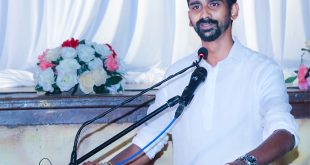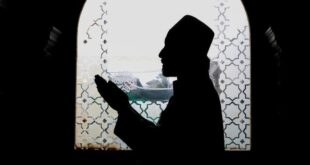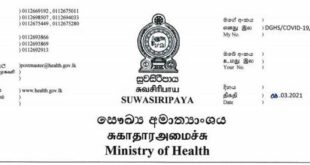At time of a pandemic, the issue of creamation or burial is neither religious nor political, but scientific.
This is in response to the opinion expressed by Tharindu Dananjaya Weerasinghe in The Island of 13 January, on the burial issue.
The writer argues that the issue of cremation, or burial, should not be decided by politics or by religion. In other words, he says it should be decided by science. I do agree with him and add it should be decided by empirical research findings of experts and scientists. Muslims believe that a corpse of a Muslim should be buried, but at a time of a pandemic for them science prevails over their religious beliefs, and they abide by scientific decision. Justice Minister Ali Sabry very clearly and repeatedly said in Parliament. He said, if it was scientifically established that burial would harm the living, he could have never raised the burial issue.
Now the question is whether the decision of the government not to bury the COVID-19-infected bodies is scientific or non scientific. This is the crust of the issue here. The writer’s argument is that the Muslim community is refusing to abide by a scientific decision taken by the government. First of all, is the decision taken by the government scientific?
The writer is a senior don and is very familiar with research works. In research works, credibility of the authors cited counts a lot, and if you cite geologists in a study of virology it will not be accepted at all. For instance, on the burial issue, who will the writer listen to? Virology scientist Prof. Malik Peiris or Geology Prof. Meththika Vidanake? WHO or Health Ministry? A Committee of virologists, microbiologists and immunogists, or a committee of judicial medical officers, general physicians, geologists and one or two microbiologists?, Scientist Prof. Chandre Dharmawardana or Health Minister Pavithra Wanniarachchi? College of Community Physicians of Sri Lanka or Minister Keheliya Rambukwella…?
Further, the writer, in his introduction, says, “…the honour of death does not depend on the manner in which the funeral is performed.” This is his personal view, not a universal truth. Yet, I would draw his attention to what William E. Gladstone said on funeral rites, “Show me the manner in which a nation or a community cares for its dead and I will measure with mathematical exactness the tender sympathies of its people, their respect for the laws of the land and their loyalty to high ideals.”
I think it is also appropriate to mention the rulings of Bombay High Court of India on burial of COVID-19-infected corpses. While rejecting the petition against burial, Chief Justice Dipankar Datta and Justice SS. Shinde ruled that there was no scientific proof to support the apprehension of the petitioners that novel coronavirus could spread through cadavers, and the right to a decent burial was equal with the right to life guaranteed under the Indian constitution and the court also held the petitioners were rather insensitive to the feelings of others.
The statement of the writer “If the cremation is forbidden by God’s order, what needs to be done, at this moment, is not to change the common law of the country, but to ask for God’s permission,” is childish and makes no sense to me.
The writer considerably quote from the Holy Quran on the burial issue. They are insignificant and irrelevant. 1.8b Muslims living all over the world consider burial an important aspect of their funeral rites. A non Muslim trying to quote from the Holy Quran to convince 1.8b followers to the opposite is futile attempt. Therefore, I leave this part of his argument unanswered
Finally, I would like to say, at a time of pandemic, cremation or burial is not an issue of politics or beliefs but of science as the writer says. But the government is trying to sell a political decision as scientific decision, and it is a pity a senior university don is unable to understand it, let alone the laymen.
M. A. Kaleel
(The writer is a Retired Senior Class One Officer of a Sri Lanka Executive Service.)
Post Disclaimer | Support Us
Support Us
The sailanmuslim.com web site entirely supported by individual donors and well wishers. If you regularly visit this site and wish to show your appreciation, or if you wish to see further development of sailanmuslim.com, please donate us
IMPORTANT : All content hosted on sailanmuslim.com is solely for non-commercial purposes and with the permission of original copyright holders. Any other use of the hosted content, such as for financial gain, requires express approval from the copyright owners.
 Sri lanka Muslims Web Portal Sri Lanka Muslims News Center
Sri lanka Muslims Web Portal Sri Lanka Muslims News Center
 Donate
Donate


